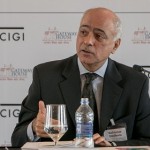Gateway House (GH): How can economic institutions, such as the WTO, World Bank and IMF, be reformed to meet the needs of developing countries?
Rohinton Medhora (RH): The reform agenda of the international financial institutions (IFIs) is often equated with the question of changing voting shares. My own view is that, that’s a necessary, but not a sufficient, condition for change. You can change voting shares and still have a corporate culture. That’s one way.
I think we need a number of things to happen at the same time. To be sure, we want emerging markets and developing countries to be represented more clearly in the voting structure of the Bank and Fund. The WTO, by the way, is a different creature because it doesn’t have a voting structure, it’s by consensus. My own view is that it would be nice if there were some kind of voting structure at the WTO, however unbalanced it might be, because pure consensus is actually a recipe for the kind of lack, of inertia that we now see at the WTO.
But the main point is to ask ourselves what we need to make the world grow so that we’re all more prosperous; second, to make the planet more sustainable; and third, to do this in a way that preserves social and economic equity. This is not a developing country agenda, this is a question of creating institutions that understand the complementarities and trade-offs between these three imperatives.
GH: What are the new global governance frameworks required for cyber and digital issues?
RH: Cyber and digital issues are interesting because there is no existing institution or even set of institutions that is going to address their governance. So we have to think very clearly about what the outcome should be and how we get there. Again, the outcome we want is one where cyber and digital help us grow our economy, make our societies healthier, our politics clean, and do so in a sustainable way. We don’t have an institution nor do we need one. What we need to think about is: multi-stakeholder processes. That is, the business sector, which is where the technologies are mainly spawned and operationalised, (ought to be) working in tandem with governments, whose job it is to look out for people. And then civil society organisations that keep, so to speak, everyone, honest on this one.
We need to think of different models of dealing with this, but recognising that there’s a very strong technical and technological component to this. It is not something we can simply leave to the international bureaucracy.
Rohinton P. Medhora is President, Centre for International Governance Innovation (CIGI), Canada.
This interview was exclusively conducted for Gateway House: Indian Council on Global Relations. You can read more exclusive content here.
For interview requests with the author, or for permission to republish, please contact outreach@gatewayhouse.in
© Copyright 2019 Gateway House: Indian Council on Global Relations. All rights reserved. Any unauthorized copying or reproduction is strictly prohibited.


